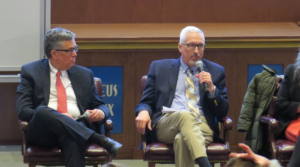Facing Election Burnout
Image Courtesy of BBC News
By: Franchetta Groves
It’s the only thing that anyone can talk about right now. All of our social media feeds, news updates, and conversations are focused on it: the election. No matter who you voted for, or your political leaning, it seems impossible to escape, and to be completely honest, it can leave us feeling drained.
This week I have found myself completely exhausted with politics. While I think it’s incredibly important to remain updated on politics and to engage in healthy debate, this week (after months of following debates, Twitter feuds, and scandals) checking in on the updates of our country felt like an unbearable task.
If you have also felt this way, you are not alone. One study found that 68% of American adults reported that the 2020 presidential election was a significant source of stress in their life. This is up from the 2016 election, during which 56% of Americans questioned said that it was a significant source of stress. These feelings weren’t exclusive to one political party either: 76% of Democrats and 67% of Republicans have been feeling stressed about the election and its results.
2020 has felt like a never-ending cycle of “what’s next?” The coronavirus pandemic and the stresses of having to go into lockdown have created many unprecedented emotions. Heightened by this, it seems that we are constantly staring at a screen, whether scrolling through social media to fill the time or checking for the latest update. Like a car crash, you can’t look away, our eyes stay glued to the screen, checking for the most recent controversy, comment, or news story.
Joe Biden has been announced the president-elect, however, recent accusations of voter fraud in states such as Wisconsin, Michigan, and Pennsylvania show that the election drama is far from over. So it raises the question for us as individuals: How can we continue to stay updated without facing election burnout?
One way to do so is to limit your screen time to increments of thirty minutes. No matter the political climate, multiple studies have found a strong link between social media and increased rates of depression, anxiety, and other mental health struggles. Dealing with the polarized climate of the internet can only add to our frustrations. To combat this, put down the phone and try to engage with non-political activities in the real world. Go for a walk, read a book, or find a new hobby to get your mind off of the noise.
Similar to the tip above, allow yourself to partake in some healthy escapism. While it’s not the most productive use of your time to constantly only pay attention to the drama of reality tv, giving yourself a break to escape into the mindless drama for an episode or two could be the rest your mind is craving. Allow yourself to unwind with some Netflix or the latest episode of “The Bachelorette.”
Or maybe you decide you want to educate yourself on something non-political. Explore new topics removed from the polarization of today’s political climate and leave the screeching and Twitter fighting to the politicians.
Finally, remind yourself that the fate of the country is not on your shoulders. It can be easy to feel as though you need to take to social media to comment on every update or engage in every single debate in the comment sections. Social media has made each of us political commentators, and while it can be a great place to stay engaged in politics, getting locked in those echo chambers is not the greatest for our mental health (or political discourse!).
Continue to educate yourself and stay updated as you see fit, but give yourself breaks from the mayhem and try to respect those who think (or voted!) differently than you. By breaking free from the havoc of social media, you might be able to avoid that dreaded stress and election burnout.







